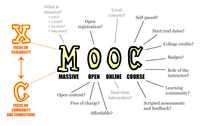
Photo from wikipedia
Purpose This study investigated how teaching, social, and cognitive presence within the community of inquiry (CoI) framework impacts Chinese college students’ online learning satisfaction through self-regulated learning and emotional states.… Click to show full abstract
Purpose This study investigated how teaching, social, and cognitive presence within the community of inquiry (CoI) framework impacts Chinese college students’ online learning satisfaction through self-regulated learning and emotional states. Methods A total of 2608 Chinese college students from 112 universities completed a 38-item Likert scale survey measuring teaching, social and cognitive presence, self-regulated learning, emotional states, and online learning satisfaction after COVID-19 restrictions were lifted on December 7, 2022. The study examined the influence of teaching, social, and cognitive presence on online learning satisfaction, mediated by self-regulated learning and moderated by emotional states using SmartPLS. It also analyzed demographic differences using multi-group analysis in the model. Results The results indicated a significant positive relationship between a) self-regulated learning and online learning satisfaction, b) teaching presence, cognitive presence, and self-regulated learning, but no relationship between social presence and self-regulated learning. Additionally, self-regulated learning partially mediated the relationship between teaching and cognitive presence and online learning satisfaction. In contrast, self-regulated learning did not mediate the association between social presence and online learning satisfaction. Positive emotional states moderated the relationship between self-regulated learning and online learning satisfaction. Implications The study advances the knowledge of these factors influencing online learners’ satisfaction, which can help create efficient programs and regulations for students, teachers, and policymakers.
Journal Title: Psychology Research and Behavior Management
Year Published: 2023
Link to full text (if available)
Share on Social Media: Sign Up to like & get
recommendations!